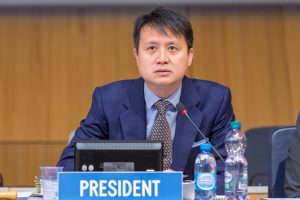
From November 13-17, 2017, the World Intellectual Property Organization’s (WIPO) SCCR met for its 35th session in Geneva, Switzerland. The Draft Agenda for the session outlines the various topics and objectives that were to be discussed at these meetings. The most pressing and longstanding of these topics was the protection of broadcasting organizations and the limitations and exceptions for libraries and archives, as well as the limitations and exceptions for educational and research institutions and for persons with other disabilities.
The Draft Action Plans on Limitations and Exceptions for the 2018-19 Biennium which was also presented at the session, outlined the list of limitations and exceptions that were to be made for the selected actors. As stated by Teresa Hackett, the EIFL Copyright and Libraries Programme manager, an “action plan is important to give the Committee direction on its future work, as well as helping library groups prepare for their work ahead” (Hackett). Yet, despite the widespread acknowledgments by the members on the progress shown through the draft action plans presented by the secretariat, it was not formally adopted. Instead, it will be revised and presented at the SCCR’s 36th session in April of 2018.
There were many studies presented at the 35th session which outlined outstanding problems on copyright in the digital age. Some worth noting include the one presented by Professor Kenneth Crews, an attorney, who presented his study on Copyright Limitations and Exceptions for Libraries and Archives, indicating that “a number of countries have revised their copyright laws and the exceptions they provide to libraries and archives … fewer countries have no exception, and fewer countries are relying on general exception” (Saez). A Proposal to Advance Discussions was prepared by the Delegations of Argentina, Brazil and Chile, outlining a number of exceptions that “should not conflict with a normal exploitation of the programme-carrying signal and not unreasonably prejudice the legitimate interests of broadcasters and cablecasters” (Saez). Lastly, a Study and Additional Analysis of Study on Copyright, Limitations and Exceptions for Educational Activities was presented by Daniel Seng, a law professor at the University of Singapore, which examined “WIPO member states’ legislation as of August 2017 … to understand whether and how member states relied on the existing exceptions and limitations in the Berne Convention for the Protection of Literary and Artistic Works to construct their own limitations and exceptions in their national laws” (Saez).
So, what can we expect at the 36th session of the SCCR? According to the Draft Action Plans on Limitations and Exceptions for the 2018-19 Biennium, the five categories of limitations and exceptions remain intact: libraries, archives, museums, educational and research institutions, and persons with other disabilities (Balasubramaniam). The work plan suggests studies, brainstorming exercises, seminars, and conferences to take place in the upcoming year, however, no agreements have been made between countries on whether or not WIPO will establish new international rules in the aforementioned areas.
